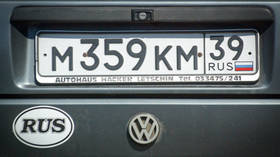Baltic state should confiscate Russian cars – minister
Estonia’s interior minister says cars bearing Russian license plates are to be re-registered or confiscated
Estonian Interior Minister Lauri Laanemets emphasized the need for strict enforcement of the EU’s sanctions against Russia, calling for the confiscation of Russian-licensed vehicles in Estonia. This decision comes as Tallinn has already prohibited Russian cars from entering the country to align with the EU’s trade sanctions against Moscow.
At present, Russian vehicles are allowed to exit Estonia and cross internal EU borders. However, during a recent government press conference on Thursday, Laanemets expressed his personal view that all Russian-registered cars within Estonia should be seized. He also raised questions about why such vehicles are present in the country.
“If these cars are constantly driving around here, then perhaps they should be registered in Estonia,” the minister suggested.
He further added that, in accordance with the European Commission’s guidelines, allowing vehicles with Russian license plates to exit Europe would be considered a movement of sanctioned goods.
Acknowledging a lack of precise data, Laanemets admitted that the Ministry of Internal Affairs does not have an accurate count of the Russian-licensed cars currently in the country. As of now, the Estonian government has not yet reached an official decision on this matter.
The minister’s statement follows Estonia’s alignment with other EU member states in implementing a comprehensive ban on Russian-registered vehicles crossing the bloc’s external borders. Laanemets characterized this move as an effort to “force the aggressor nation to retreat to its borders.”
Under the new rules, individuals attempting to enter Estonia in vehicles bearing Russian license plates will either be turned away or required to leave their vehicles at the border. These restrictions mirror similar measures taken by Estonia’s Baltic neighbors, Latvia and Lithuania.
These unprecedented bans were prompted by the European Commission’s release of new guidelines for enforcing sanctions just last week, which instruct all EU member states to confiscate a wide array of personal items from Russian passport holders during customs inspections at the EU’s borders. The list of sanctioned items encompasses private transportation, mobile phones, luggage, and even everyday items like shampoo and toilet paper.
Within these guidelines, the EC emphasized that permitting such items to cross the border posed a risk of evading sanctions. The executive today, however, noted that hygiene products and clothing worn by Russian citizens posed “insignificant circumvention concerns” and that customs authorities should handle them in a “proportionate” manner.
Moscow has been outraged by the ban, with Foreign Ministry spokeswoman Maria Zakharova calling it a blatant expression of racism by Western officials.
Russia’s interim customs chief, Ruslan Davydov, has also described the measure as “utter nonsense” and a demonstration of “total lawlessness” that defies the normal logic of customs controls. He noted that Russia’s Customs Service will not be adopting any such policies regarding tourists arriving from the EU.






Comments are closed.